Top Banks in Greece
Greece ranks 77th among the freest economies in the 2022 Index, with an economic freedom score of 61.5.
Greece ranks 77th among the freest economies in the 2022 Index, with an economic freedom score of 61.5. Greece is 38th out of 45 nations in Europe, with an overall score higher than the global average but lower than the average for the region.

Greece's five-year economic improvement has been erased by a severe fall in 2020. But a five-year pattern of increasing economic independence has persisted with the help of noticeably better rankings for the rule of law.
Greece gained 6.5 points in total economic freedom during 2017 and is now classed "Moderately Free" after being labeled "Mostly Unfree" for over a decade. However, monetary and trade freedom remains strong; excessive government expenditure strains the economy.
The Top Banks in Greece: The Banking System
The Bank of Greece, a central bank that participates in the Eurosystem, and 39 other financial institutions make up the Greek banking system as of April 2016.
Eighteen credit institutions, including eight commercial banks, nine regional cooperative banks, and one Loan & Consignment Fund, are headquartered in Greece, and 17 are outposts of commercial banks from other EU members.

Four more are outposts of foreign banks, including Bank of America. With nearly 80% of total asset value, Greek-owned banks control the lion's market share. The remaining 8% is split amongst specialized organizations and regional cooperative banks, with foreign-owned banks holding a stake of 12%.
The top four banks dominate 90% of the loan and deposit markets. Greek banks had significant losses during the Greek debt restructuring procedures in March and December 2012. However, they have been recapitalized.
Early 2013 saw the acquisition by Piraeus Bank of the Greek branches of three Cypriot banks (Bank of Cyprus, Cyprus Popular Bank, and Hellenic Bank). In addition, Piraeus has a contract to buy Portuguese-owned Millennium Bank, and in 2012 it bought the sound assets of the government-owned Agricultural Bank of Greece.

The banking industry mainly stabilized in 2014 after a quick sectoral consolidation in 2012 and 2013 and adopting a broad-based recapitalization program. As a result, Greece's major banks largely relied on the European Central Bank as of May 2015.
However, the economic uncertainty brought on by the new administration's policies and the impasse in talks with the nation's official sector creditors has resulted in a sharp decline in deposits.
As part of the initial implementation of the ESM bailout agreement in August 2015, Greece recapitalized its four largest banks for the third time in five years in November 2015. Again, large hedge funds from the United States and other countries were involved.
Since over 40% of all loans held by banks are non-performing, the banking system can still not sustain the country's economy. As a result, creating an NPL market to settle these loans has stalled.
Because of this, companies of all sizes need help getting bank loans to fund their operations. Due to this limitation, international financial institutions are currently attempting to provide loans and add more liquidity to the Greek market, including the European Bank for Reconstruction and Development.
As of March 1, 2016, deposits totaled €121.4 billion, a small decrease from €138.5 billion the previous year. Since December 2009, total deposits have decreased by €116.1 billion.
The Leading Greek Banks
The financial crisis completely changed Greece's banking system. Legislation, restructuring, and recapitalization have resulted in a sector that is now globally acknowledged for its high capitalization standards and significant gains in stability, governance, and transparency.

The consolidation of over 60 banks resulted in four systemic banks - National Bank of Greece (NBG), Alpha Bank, Eurobank, and Piraeus Bank - and a few nonsystemic banks, the largest of which being Attica Bank.
Despite the disturbance, the banks have kept themselves afloat and are eventually making a profit. Following the consolidation and liquidation of 14 credit institutions, the industry now consists of four systemic banks and a number of smaller nonsystemic banks.
Since 2010, the four systemic banks have completed four stress tests and three rounds of recapitalization totaling about €65 billion. HFSF is in charge of the state's bank holdings, which include 40% of NBG, 26% of Piraeus Bank, 11% of Alpha Bank, and 2% of Eurobank.
Based on FY16 statistics, Greece has around 10% of the EU's total NPEs, accounting for 45% of total domestic loans, or €105 billion. However, the ECB has given the Greek banking industry a target of reducing NPE volume to €67 billion by the end of 2019.
With an aggregate CET1 of over 16% in 2016 and a capital ratio that is comfortably higher than the EU average of 13.6%, this ratio is one of the highest in Europe. In addition, the bank recovered €8.5 billion in funds transferred abroad between 2015 and 2017.
Greece's central bank
The Bank of Greece is the country's central bank. Its headquarters are on Panepistimiou Street in Athens, although it has other national branches. It was established in 1927 and formally began operations in 1928.
The present headquarters building was constructed ten years later, in 1938. The Bank of Greece is a publicly traded company on the Athens Exchange.
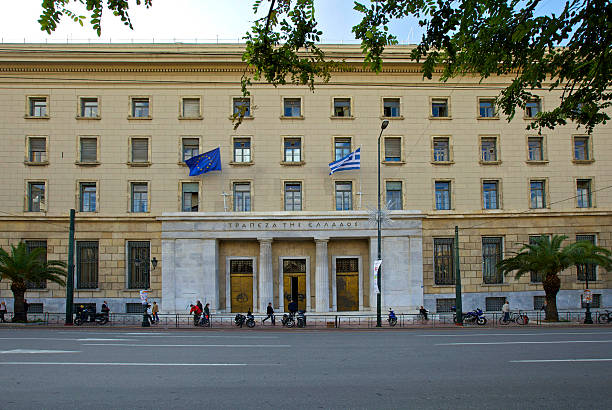
The Bank of Greece was created by Law 3424/7 in December 1927. It is a European System of Central Banks (ESCB) component. Since June 12, 1930, the Bank of Greece's shares has been registered and listed on the Athens Exchange.
It is a large state-owned SA share business with unique benefits, limits, and tasks. It cannot function as a commercial bank, and the number of shares owned by the Greek state cannot exceed 35%. It employs over 1,800 people.
The Bank of Greece's principal goal is to maintain price stability in Greece. In addition, it oversees private banks and serves as the Greek government's treasurer and fiscal agent.
Piraeus Bank
Piraeus Bank is a Greek international financial services firm headquartered in Athens. Since January 1918, Piraeus Bank's equities have been traded on the Athens Stock Exchange (ATHEX).
In Greece, this is the country's biggest bank, with a 30% share of the market in loans (34.4 billion) and a 29% market share in deposits (54.6 billion). In addition, the universal bank Piraeus Bank offers a diverse range of banking services.
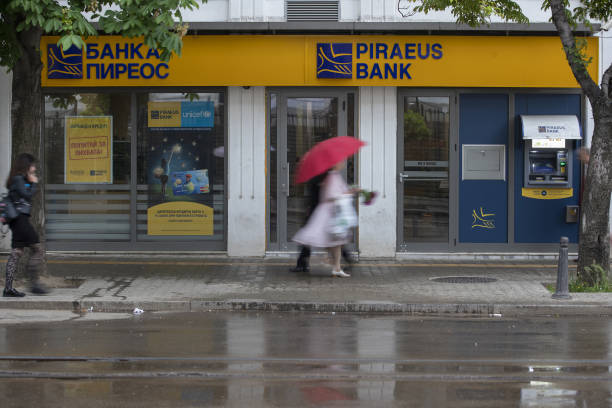
Historically, a bank that supported SMEs has expertise in agricultural banking, consumer and mortgage finance, green banking, capital markets, investment banking, leasing, and electronic banking. In 1918, the bank began trading on the Athens Exchange.
In 1975, the Greek government acquired the bank and turned it into a universal bank. Sir Basil Spence designed the new headquarters on Stadiou Street in the heart of Athens.
The government privatized the bank in December 1991, and it has since expanded in size and scope.
The bank today has 133 offices in Frankfurt, London, Frankfurt, Bulgaria, Ukraine, and Albania, in addition to 484 branches in Greece that offer various banking services.
National Bank of Greece
The National Bank of Greece was the first bank to be created in the Modern Greek State in 1841. It has played a significant role in the country's economy throughout its 179-year history.
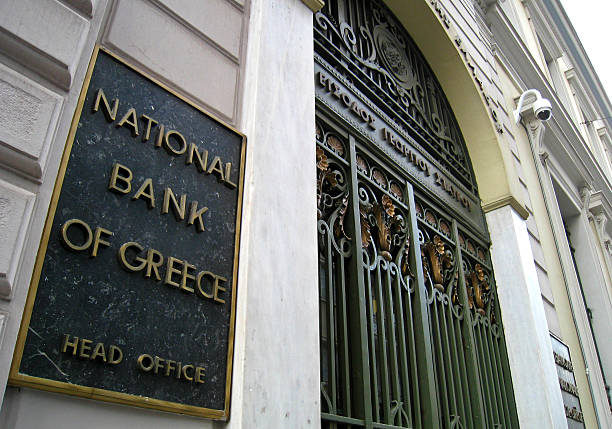
Currently, NBG is in charge of one of Greece's biggest financial groupings, which significantly impacts the country's attempts to modernize economically and socially.
Apart from NBG, the NGB Group primarily works in 8 countries and employs 9,556 people across its two commercial banking affiliates in North Macedonia and Malta (continuing operations).
It offers various financial goods and services, such as brokerage, insurance, leasing, factoring, deposit and investment services, different financing options, and other financing facilities.
It is the country's second-biggest bank by total assets, the largest by deposits, and the third-largest bank by Greek loan assets. Through its 542 Greek locations and 336 foreign branches, the bank offers financial goods and services to private individuals and institutions.
Alpha Bank
In terms of market value, Alpha is the largest bank in Greece. The bank has 671 branches and subsidiaries around southern Europe, offering financial goods and services to people and businesses in Greece and other countries.
Alpha Bank was founded in 1879 in Kalamata by John F. Costopoulos as a small commercial firm. In 1918, his banking division renamed the Bank of Kalamata.
After relocating its headquarters to Athens in 1924, the bank was named Banque de Credit Commercial Hellenique. In 1947, the name was changed to the Commercial Credit Bank, followed by the names Credit Bank and Alpha Credit Bank in the following years.
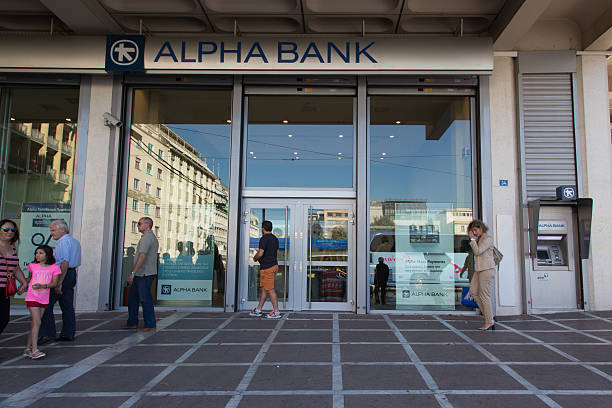
Ionian Popular Bank's 51% shares were purchased by ACB in 1999, and the bank was integrated by ACB in 2000. Additionally, it changed its name to Alpha Bank. In 2002, a merger effort between Alpha Bank and the National Bank of Greece failed.
On March 31, 2014, Alpha Bank accomplished its €1.2 billion capital raising. On April 17, 2014, the bank redeemed the whole value of the Hellenic Republic's Shares.
On October 26, 2014, Alpha Bank reported that it completed the Comprehensive Assessment of the European Central Bank in the Static Adverse Scenario with a CET1 of 8.07% and a Capital Surplus of Euro 1.3 billion.
Based on the dynamically unfavorable assumptions, CET1 is 8.45%, with a capital surplus of €1.8 billion. In 2014, Alpha Bank acquired Citibank's Greek retail banking business.
Citibank Greece
The international bank Citibank is among Greece's biggest card providers. In addition, it is the first Greek bank to provide investment products to Greek consumers.
Citibank Greece is a division of Citibank National Association, with its headquarters in Athens. It provides banking goods and services to the public, financial institutions, and companies.
In 2014, Citibank transferred over 720 personnel, its wealth management division, and a retail branch network that serves 480,000 customers when it sold its retail banking operation in Greece to Alpha Bank.
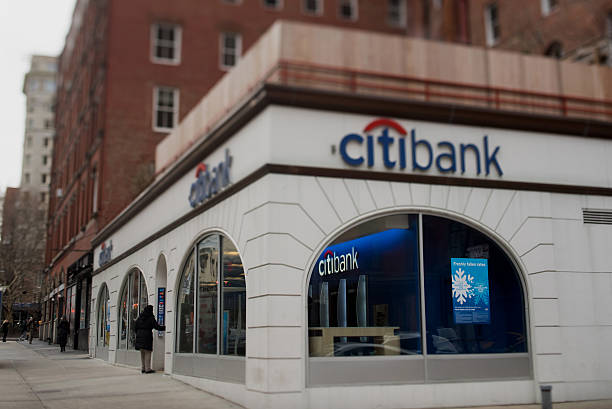
Citi Greece is a valued partner to Greek financial institutions and major corporations through its advisory, debt and equity capital markets, and credit extension services. In addition, Citi's unrivaled global footprint provides an indispensable advantage to over 250 subsidiaries.
It offers a complete range of banking services, such as cash and liquidity management, trade finance services, and advanced reporting tools via a sophisticated and widely recognized corporate e-banking platform.
Citi Greece is the leading beneficiary of institutional flows for Athens Exchange trading. For 18 years, the Securities Services division has been and continues to be the sole major custodian in Greece.
- Commercial banks dominate Greece's financial industry, accounting for 90% of overall financial sector assets. Another 5% is accounted for by insurance firms, while the rest is made up of other financial firms such as leasing and factoring organizations.
- Banking is a significant economic sector in Greece, with total assets approaching 200% of GDP.
- The asset-to-GDP ratio is the highest among BSTDB member nations. Significantly higher than the eurozone average of 86%, loans from the banking industry equated to 93% of GDP in 2020, also a record-high number in the area.
- The industry is highly consolidated, with more than 80% of assets held by the four major banks. However, these banks' shares are near 20%, indicating a relatively competitive market structure.




or Want to Sign up with your social account?